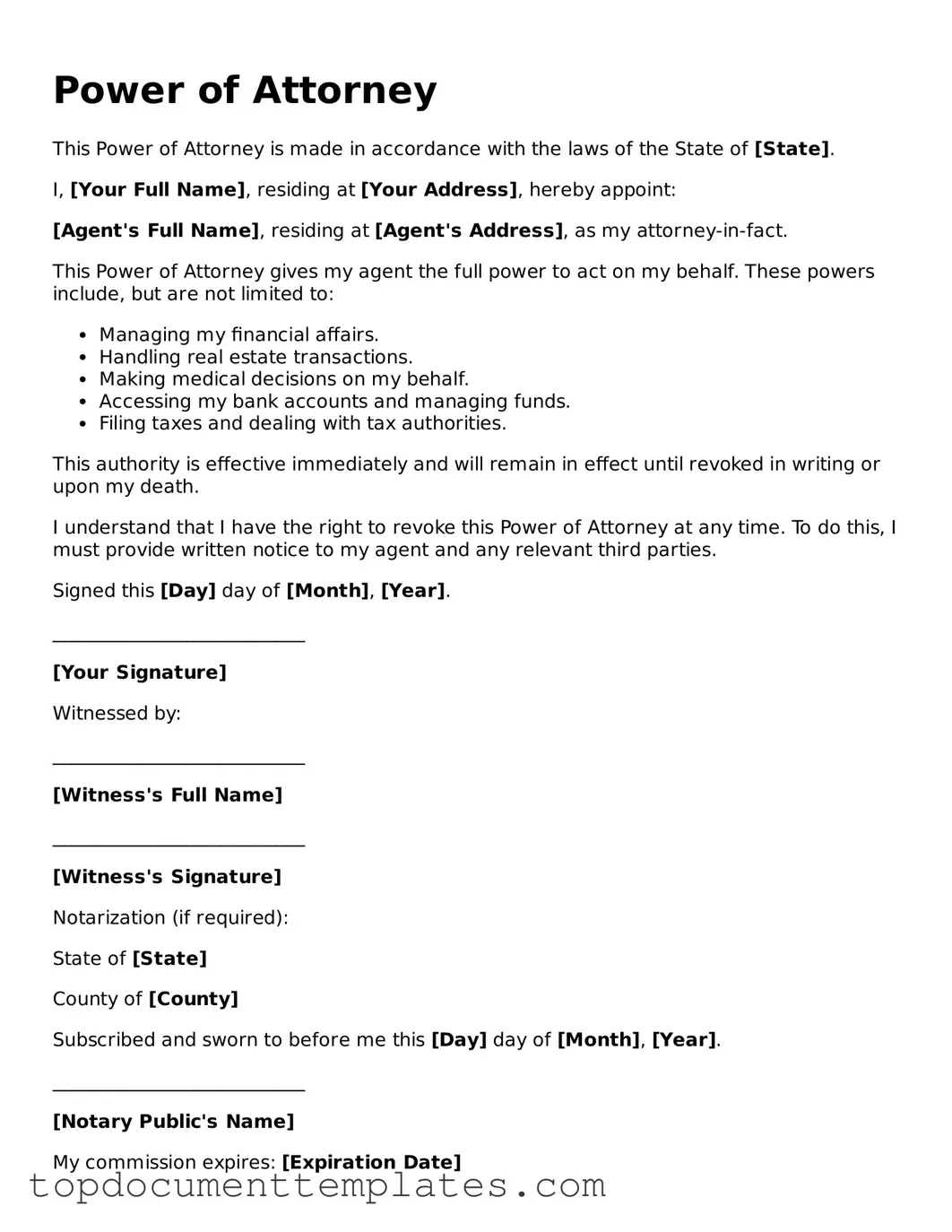Official Power of Attorney Template
The Power of Attorney (POA) form is a vital legal document that empowers an individual, known as the agent or attorney-in-fact, to make decisions on behalf of another person, referred to as the principal. This form can cover a wide range of responsibilities, including financial matters, healthcare decisions, and property management. It allows the agent to act in the best interest of the principal when they are unable to do so themselves, whether due to illness, disability, or absence. There are different types of POA, such as durable, which remains effective even if the principal becomes incapacitated, and springing, which only takes effect under specific circumstances. Additionally, the form must be executed in accordance with state laws, which often include requirements for signatures and witnesses. Understanding the nuances of the Power of Attorney form is crucial for ensuring that personal wishes are respected and that someone trustworthy is designated to handle important matters when needed.
Similar forms
- Living Will: A living will outlines a person's wishes regarding medical treatment in situations where they cannot communicate. Like a Power of Attorney, it allows individuals to express their preferences, but it specifically focuses on healthcare decisions.
- Health Care Proxy: This document designates someone to make medical decisions on behalf of another person if they become incapacitated. Similar to a Power of Attorney, it grants authority to act, but it is limited to health-related matters.
- Durable Power of Attorney: This is a specific type of Power of Attorney that remains in effect even if the person becomes incapacitated. It serves the same purpose as a general Power of Attorney but ensures continuity of authority during periods of incapacity.
- Financial Power of Attorney: This document allows someone to manage financial matters on behalf of another person. It is similar to a Power of Attorney but focuses solely on financial decisions and transactions.
- Trust Document: A trust document creates a legal arrangement where one party holds property for the benefit of another. While it differs in structure, it shares similarities with a Power of Attorney in that it involves delegating authority to manage assets.
Power of Attorney - Tailored for State
Guidelines on Writing Power of Attorney
After obtaining the Power of Attorney form, you will need to complete it accurately to ensure that your designated agent can act on your behalf. Follow the steps outlined below to fill out the form correctly.
- Begin by entering your full legal name in the designated space. Make sure it matches your identification documents.
- Provide your current address, including city, state, and ZIP code.
- Identify the person you are appointing as your agent. Write their full name and address clearly.
- Specify the powers you wish to grant to your agent. Check the appropriate boxes or write in any additional powers you want to include.
- Indicate the duration of the Power of Attorney. Decide whether it will be effective immediately, upon a specific event, or for a limited time.
- Sign and date the form in the designated area. Ensure your signature matches the name you provided at the beginning.
- Have your signature witnessed, if required by your state. Some states may also require notarization, so check local laws.
- Provide a copy of the completed form to your agent and keep a copy for your records.
File Information
| Fact Name | Description |
|---|---|
| Definition | A Power of Attorney (POA) is a legal document that allows one person to act on behalf of another in legal or financial matters. |
| Types | There are several types of POA, including General, Durable, and Medical. Each serves different purposes. |
| Durability | A Durable Power of Attorney remains in effect even if the principal becomes incapacitated. |
| State-Specific Forms | Each state has its own specific requirements for POA forms. Ensure compliance with local laws. |
| Governing Laws | In California, the POA is governed by the California Probate Code, while in New York, it falls under the New York General Obligations Law. |
| Execution Requirements | Most states require the POA to be signed by the principal and witnessed or notarized. |
| Revocation | The principal can revoke a POA at any time as long as they are mentally competent. |
| Agent's Authority | The agent's powers can be broad or limited, depending on how the document is drafted. |
| Health Care Decisions | A Medical Power of Attorney specifically allows the agent to make health care decisions for the principal. |
| Importance | Having a POA can prevent legal disputes and ensure that your wishes are followed if you cannot act on your own behalf. |
Consider Other Forms
Simple Rental Agreement Between Family Members - This document acknowledges the unique dynamics of renting within a family context.
Printable Mar - Informs necessary adjustments based on consumer medication needs.
